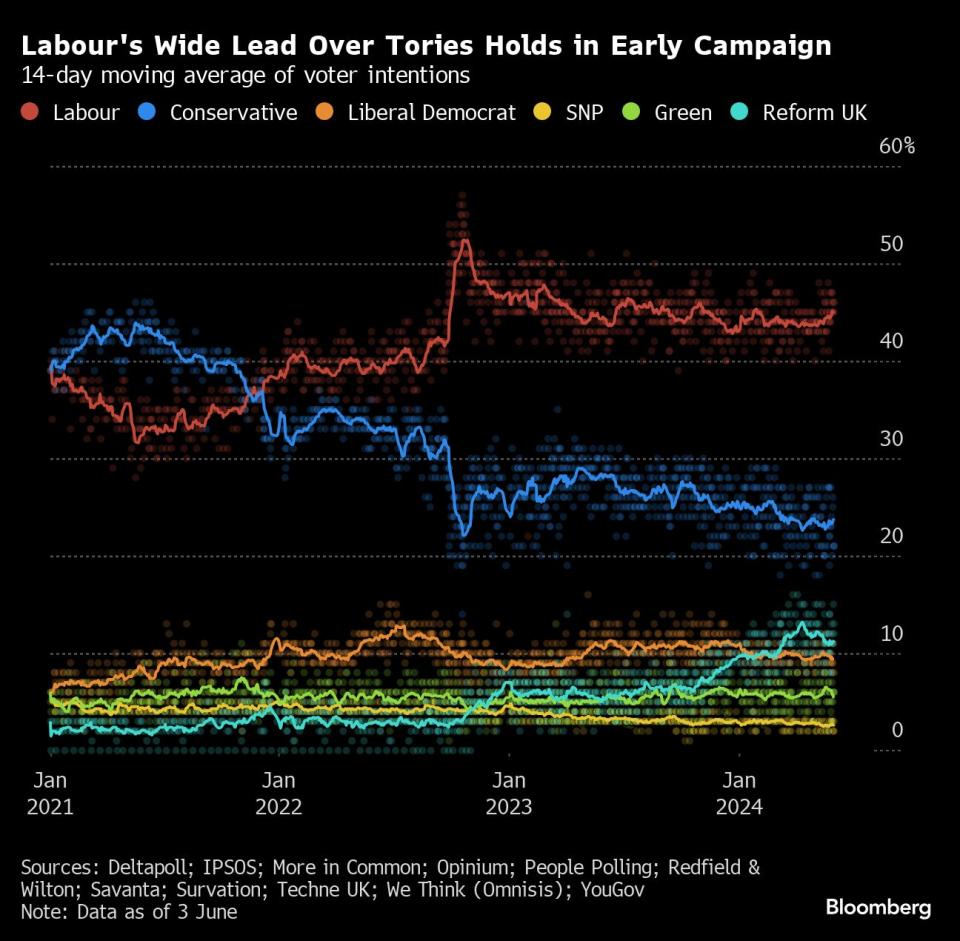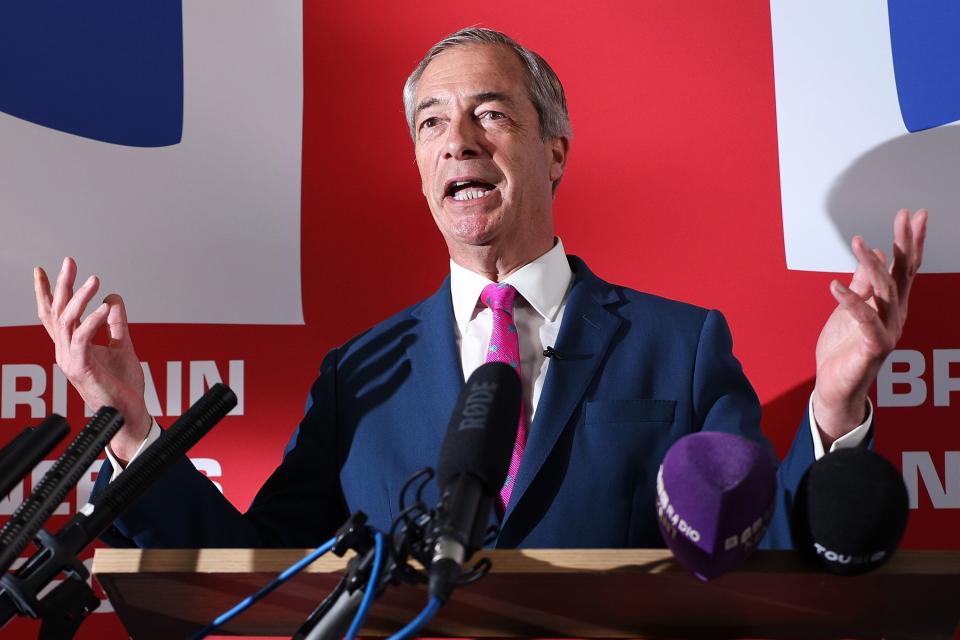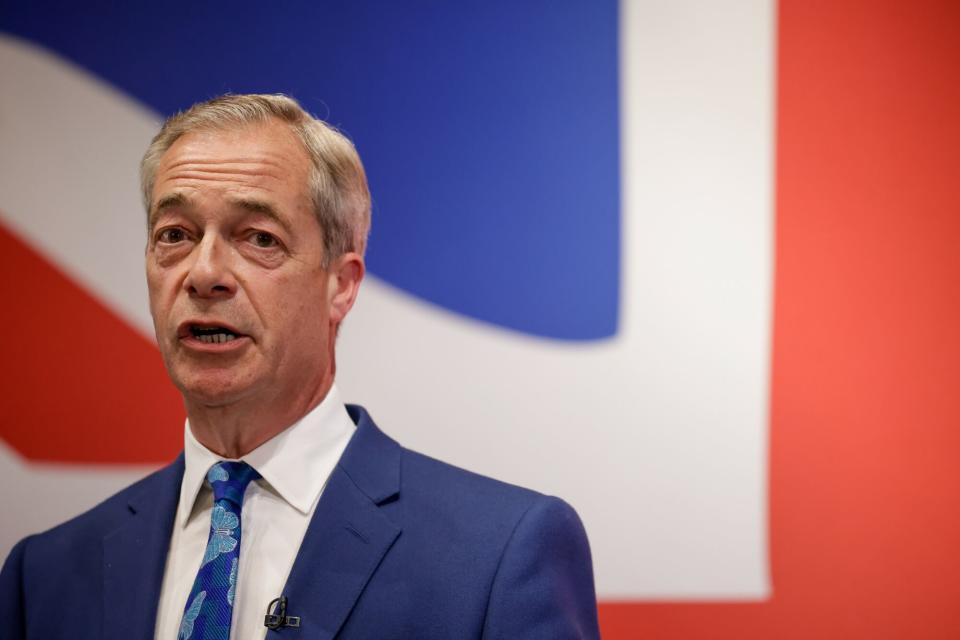Farage Shakes Up UK Campaign With Tories Facing Poll Disaster
(Bloomberg) -- Nigel Farage’s critics call him a “shameless opportunist.” On Monday, the Brexit architect picked the perfect moment to deal Rishi Sunak a gut punch — the day before the first TV debate of the UK election campaign and just as a major poll put the prime minister’s ruling Conservatives on track for a historic rout.
Most Read from Bloomberg
Modi Vows to Retain Power Even as Party Loses India Majority
Short Sellers in Danger of Extinction After Crushing Stock Gains
Bonds Rally as Traders Reload Fed Bets After Data: Markets Wrap
Stock Pickers Defy Wall Street Norm to Risk It All on a Few Bets
Intel CEO Takes Aim at Nvidia in Fight for AI Chip Dominance
With trademark chutzpah, Farage convened what he called an “emergency” press conference in London to tell reporters that he would, in fact, be standing as a candidate for his Reform UK party in the election — reversing a decision from less than two weeks ago that helping Donald Trump back into the White House in the US presidential election in the autumn was a better use of his time.
In the space of a few minutes, Farage turned Conservative politicians — who were already despondent about their chances of overturning the Labour Party’s 20-plus lead in the polls — close to despair.
“What I’m really calling for — or what I intend to lead — is a political revolt,” Farage told the packed conference room, using the British flag as a backdrop. He said he planned to seek election in Clacton, the coastal town in eastern England where one of his previous political parties enjoyed its greatest success. “Nothing in this country works anymore.”
Farage’s initial decision not to run had been an early bright spot in the campaign for Sunak after he surprised Westminster observers by calling a snap election on July 4. The Tories have spent the first two weeks of the campaign trying to win back traditional Tory voters who have switched or are tempted by Reform.
In another pitch for right-wing support, people familiar with the matter told Bloomberg that Sunak is considering hardening the Conservatives’ stance on the European Convention on Human Rights — a bugbear of right-wing voters who blame it for the government’s struggle to lower immigration.
The strategy was designed to address Tory fears that a split in the right-wing vote would allow Labour an easy path to victory.
The danger that 14 years of Conservative governance will end not just in defeat, but a rout, was highlighted by YouGov modeling released just an hour after Farage’s announcement: Labour is heading for a historic majority — bigger even than that secured by the party under Tony Blair in the 1997 landslide — in the vote on July 4, according to the polling company.
YouGov’s projection puts Labour on 422 seats — four more than Blair — and the Tories losing more than 200 seats and securing just 140. That would give current leader Keir Starmer’s party a 194-seat majority; for the Tories, it would be their worst defeat since 1906.
Earlier, a Bloomberg composite survey based on data from 11 polling companies gave Labour a lead of more than 20 points.
Sunak and Starmer are set to face each other Tuesday night in an ITV debate, the first of the campaign. With the prime minister distracted on the Tory right flank, the Labour leader is building a campaign around appealing to more centrist voters, seeking to annex traditional Tory territory by emphasizing his credentials on national security and managing the economy.
Starmer will meet with pensioners in the North West of England on Tuesday to discuss the impact that the energy crisis has had on them and argue that his plan to create a public clean energy company will allow the UK to be less dependent on overseas fossil fuels.
Despite Labour’s lead — often in excess of 20 points — many Tories are more concerned about the threat from the right posed by Reform, which a year ago stood at around 5 points and now polls more than double that.
It’s why Sunak has focused so much on the Reform threat, with early campaign promises to bring back compulsory national service for teenagers, tax guarantees for pensioners, and a plan to rewrite the Equality Act to change the definition of “sex” to “biological sex” — all aimed at the political right-wing.
On Tuesday, Sunak will announce that he would introduce an annual cap on visas in an effort to stem migration, though he won’t set out a precise figure. The policy appears to be a direct response to Farage who’s long put pressure on the Conservative Party to clamp-down on immigration.
But the strategy was predicated on Farage not standing. His dramatic U-turn — he’ll officially launch his candidacy in Clacton on Tuesday — suggests Sunak and his team have made a tactical error, according to Conservative aides who spoke on condition of anonymity about their party’s faltering campaign.
One said Farage’s return was a disaster for the Tories, while another said Sunak’s early policy announcements will have alienated centrist voters while doing little to shore up support from voters who will now opt for Reform.
Another staffer described the Conservative Party as finished, and said Tory defections to Reform were now likely because Farage fronting the campaign gives it legitimacy. As well as becoming a Reform UK candidate, Farage also said he would be the party’s leader for five years, replacing Richard Tice.
“This is nothing short of a disaster for the Conservative Party: everything about this election, from the timing to the apparent strategy, was aimed at squeezing Reform UK’s vote,” Chris Hopkins, political research director at pollster Savanta, said in a statement. “With Farage’s announcement that is now much harder, and Rishi Sunak has nowhere to go - politically or electorally.”
With the Tories already struggling in the polls, Sunak’s team has been looking for game-changers. One is the potential move on the ECHR, which is blamed by right-wingers for preventing a harsher crackdown on asylum-seekers.
But he risks an internal fight in the Tory party that could exacerbate his problems. Some Conservative advisers are calling for Sunak to commit to working with European partners to reform the convention, or failing that, leave it. Other Tories have previously called for a referendum on Britain’s membership of the ECHR. Many on the moderate side of the party — including several Cabinet ministers — oppose leaving the body.
Meanwhile, Farage made clear he is also targeting Labour, though he said Starmer’s party would claim victory on July 4. “Keir Starmer — yes he’ll win, but we’re absolutely going to make sure that his percentage is a lot smaller than it is now,” he said.
Though Farage, 60, has lost in seven previous attempts to win a parliamentary seat, he has maintained considerable sway in British politics and kept Westminster guessing for months about whether he would stand in the election — even from thousands of miles away on a reality TV set in an Australian rainforest.
“This election needs a bit of gingering up,” Farage said.
--With assistance from Joe Mayes and Isabella Ward.
Most Read from Bloomberg Businessweek
Startup Brings New Hope to the Pursuit of Reviving Frozen Bodies
The Budget Geeks Who Helped Solve an American Economic Puzzle
Disney Is Banking On Sequels to Help Get Pixar Back on Track
How Rage, Boredom and WallStreetBets Created a New Generation of Young American Traders
©2024 Bloomberg L.P.





